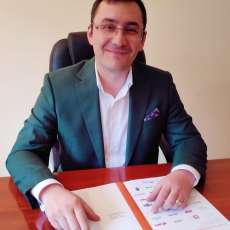Ringhel is a Romanian born software company that has developed the most complex suite of applications for the management of power and gas operators’ activity. The company started out in 2011 and at present manages over 40% of Romania’s electrical distribution and supply.
How did the idea for Ringhel’s software platform come about and what were the circumstances surrounding its creation?
My background is in electrical engineering and I am certified internationally in energy quality. Before starting Ringhel in 2011 I worked for two energy companies, developing software for internal process optimization, and eventually started thinking about the possibility of designing myself a leaner solution for commercial purposes. I started working on this idea sometime in December 2010, splitting my time between my day job and late nights, and in about six months I had the first stable version of the product. I quit my job and put forward my new solution to my previous employer, now turned very first customer.
Things did not progress as well as I was hoping though because, at the time, our number one competitor was Excel and the market was reluctant to try out new solutions. Unfortunately, I had to let go of the two employees I had brought on board and rethink my next steps. The initial customer stayed with me and I kept improving the product by myself until 2014 when, following market developments, I noticed new opportunity for us to push the solution. We quickly managed to get one customer on board, then a second and a third and this created a snowball effect that took us to where we are now: a market leader, with a portfolio that includes about 50% of the country’s electricity suppliers and 20% of natural gas suppliers, as well as a team of 27 people that keeps growing.
What was the tipping point for companies to adopt your technology and how open do you find the industry generally to new solutions?
As more and more players joined the supply market, the competition increased so companies needed to figure out ways to gain competitive advantages. We were just the right partner to provide this advantage for them, because our solution had the capabilities to make their work significantly more efficient. If in 2011 companies did not have an appetite for change, nowadays they are proactively looking for tools to optimize their work and ensure that the knowledge stays within the company even as employees change.
At an international level we have a great deal of competitors and based on how we see them evolving it is clear that the need for automation and optimization is growing. What we are finding is that there is a direct correlation between the openness of a market and their appetite for new technologies - Romania is for example more open than Serbia at the moment. However, the pace at which markets open up has increased and our goal is to capture this opportunity by being the first to set up shop in these markets.
GeFEE is now the most widely used platform for power and gas management in Romania. What are its key capabilities?
Our decision to focus on this particular niche has allowed us a holistic approach that extends over the entire business and value chain. The platform offers a complete solution that covers business needs in the supply of electricity and natural gas, power trading, the balancing market activity and the last resort supply.
More specifically, our suite GeFEE includes a ERP desktop solution CRM web solution. The desktop platform is meant for back office activities and manages the internal processes start to finish, from partner management to consumption points, contracts, mass invoicing, payments and reporting. The web platform offers a customer portal - the electricity and natural gas regulation provides that any supplier is required to have such a portal to engage with their customers. Besides, we also provide tools for supply agents that automate the entire sales process, a front-desk account that provides access to the entire database, as well as an account for traders to manage the relationship with other traders and suppliers.
GeFEE suite provides a module that manages the power trading, covering the acquisition of consumption of the traders, load curves, consumption management by time intervals, forecast and measurements. This module also manages the specific activity of a last resort supplier. The BRP module helps companies to balance their portfolio and manages the entire business process flow, the daily data exchange with the BRP partners and operators and also the monthly financial settlements.
What is Ringhel’s current geographical footprint and your vision for development?
In 2018 we expanded to Serbia, adapted the platform to the local needs and at present we are working on getting two new customers on board. Given the similarities between countries in former Yugoslavia, we expect the expansion efforts required on our side to be lower so we are targeting this area as a first step and next we plan to expand further into Central and Eastern Europe, and also the United States. Even though it is a mature market we see great opportunity there because the existing supply software, implemented in the 2000s, has become outdated compared to what is possible today.
Our goal for the next five years is to grow at a 60% pace year on year - this way, by 2023, we will have grown ten times compared to the present moment. We trust this will be possible given the fact that big chunks of the market are still untapped, and also due to our ambitious international expansion strategy.






